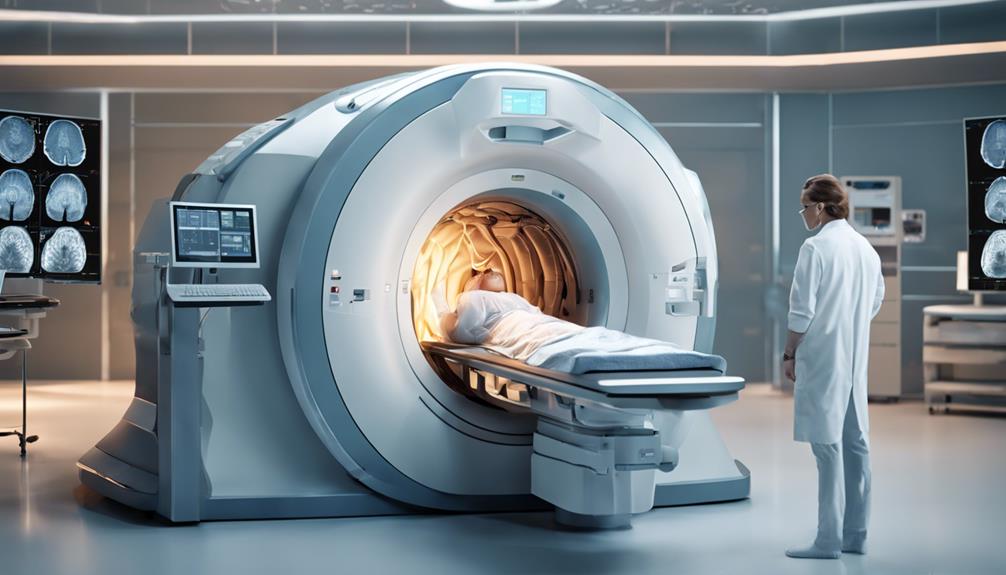
If you're eyeing a lucrative career in medical technology, you'll find that certain specialties shine in terms of salary. Surgical technologists often lead the pack, especially if you pursue advanced education and specializations. Their role in the operating room is critical, and their compensation reflects this. Close behind are radiologic technologists, who harness sophisticated imaging technologies to aid in diagnosis, earning notably high incomes with increasing experience and further specializations. Both fields offer strong job security and opportunities for career advancement, promising not only financial gain but also professional growth. Exploring the unique niches and certifications within these areas could reveal even more rewarding opportunities.
Radiologic Technologists

Radiologic technologists, who play a crucial role in diagnostic imaging, often find themselves among the higher earners in the medical tech field. You might wonder what sets them apart. Primarily, it's their specialized skill set. They're trained to operate complex imaging equipment such as X-ray machines, CT scanners, and MRIs. This expertise not only demands a high level of precision but also a deep understanding of patient safety and radiation protection.
As you explore this career, you'll find the educational requirements are quite rigorous. You'll need to complete an accredited radiologic technology program, which typically takes about two years. Additionally, most states require licensure and certification, which involves passing an exam.
The financial rewards reflect the responsibility and specialized knowledge you bring to the table. Median salaries are notably higher compared to some other tech positions in healthcare, with opportunities for further advancement and specialization. These can include roles like MRI technologists or radiation therapists, each offering a chance to increase your earning potential.
Moreover, the job outlook for radiologic technologists is promising. As the population ages, the demand for diagnostic imaging increases. This means you're not just stepping into a well-paying job but also a growing field, ensuring job security and career longevity.
Surgical Technologists
As a surgical technologist, you'll be integral to operating room teams, assisting in surgical procedures with precision and care. Your role isn't just about handing tools to surgeons but ensuring that every instrument is sterile, the environment is safe, and the patient is prepared correctly for the operation. You'll also assist in suturing, applying dressings, and counting sponges, needles, and instruments to maintain a meticulous environment.
Financially, surgical technologists see a rewarding career path, especially with specialized skills or in high-demand settings. On average, you might start with a salary that aligns with the national median of approximately $49,000 annually. However, with additional certifications and experience in particular surgical fields like cardiovascular or orthopedic surgery, your earning potential can increase significantly. Some experienced techs in top-tier hospitals or private surgical centers can earn upwards of $60,000 to $70,000 a year.
Your financial progression in this field depends heavily on where you choose to work. Urban hospitals and outpatient care centers typically offer higher wages compared to rural settings. Additionally, pursuing further education and certifications in advanced surgical technology or management roles can further boost your salary, making you one of the top earners in the medical tech field.
Clinical Laboratory Technologists

Clinical laboratory technologists play a crucial role in diagnosing and monitoring diseases by analyzing a variety of body fluids and tissues. You'd be working in settings such as hospitals, diagnostic labs, and private clinics, where your expertise is essential to the healthcare team. This role demands a keen eye for detail and strong analytical skills as you'll be tasked with interpreting complex biological information to aid in patient diagnosis and treatment.
As a clinical laboratory technologist, you can expect a rewarding salary that reflects the specialized skills and responsibilities you bring. The demand for your profession is driven by a growing need for detailed lab testing, especially with an aging population and advances in medical technology. You'd find that positions in metropolitan areas often offer higher salaries compared to rural settings due to the higher cost of living and increased demand for medical services.
In terms of financial prospects, specializing in certain areas, such as molecular biology or genetics, might boost your earning potential. Continuous education and certifications won't only enhance your skills but also position you for promotions and better pay.
In this field, staying updated with the latest techniques and technologies is key to your professional and financial advancement.
Nuclear Medicine Technologists
Nuclear medicine technologists, working at the forefront of medical imaging, play a pivotal role in diagnosing and treating diseases using radioactive materials. You'll find yourself on the cutting edge, utilizing complex equipment to create images of the body's internal workings. These images are crucial in providing accurate diagnosis, which in turn guides effective treatment plans.
In terms of earnings, you're looking at a lucrative field. The median annual salary for nuclear medicine technologists is quite competitive, often surpassing those of many other healthcare technicians. This is due to the specialized nature of the work and the significant responsibility you carry in ensuring patient safety and accurate test results.
You'll need a solid educational foundation, typically an associate's degree in nuclear medicine technology, although some pursue bachelor's degrees to further increase their earning potential. Certifications, particularly from the Nuclear Medicine Technology Certification Board, can also boost your job prospects and salary.
Moreover, the field offers you the chance to constantly learn and grow. Advances in nuclear medicine technology are rapid, and staying abreast with these innovations not only enhances your skill set but also potentially your earnings.
As you specialize further, perhaps in positron emission tomography (PET) or in radio pharmacology, your value in the job market significantly increases.
Cardiovascular Technologists

Shifting focus, let's explore another high-earning position: cardiovascular technologists, who specialize in heart and blood vessel diagnostics and treatments. If you're keen on a career that combines cutting-edge technology with life-saving interventions, this might be the perfect path for you.
As a cardiovascular technologist, you'd be involved in intricate procedures like cardiac catheterizations, echocardiograms, and vascular ultrasounds. These aren't just fancy terms; they're critical tests that help diagnose and treat patients with cardiovascular diseases. You'd work closely with cardiologists, often in high-stakes environments where your skills directly impact patient outcomes.
The financial rewards are compelling. With experience, you could be looking at a salary that's well above the median for all occupations. Plus, given the aging population and the prevalence of heart disease, job security in this field is robust. The demand for cardiovascular technologists is projected to grow, so it's a stable career choice with room for advancement.
You'll need formal education—typically an associate degree or a postsecondary certificate. Many states also require professional certification, which could further boost your earning potential.
MRI Technologists
If you're fascinated by the inner workings of the human body, becoming an MRI technologist might be the right career path for you. As an MRI technologist, you'll operate Magnetic Resonance Imaging (MRI) scanners, which use strong magnetic fields and radio waves to create detailed images of the body. These images are crucial for diagnosing a variety of conditions, from brain tumors to torn ligaments.
MRI technologists are well-compensated for their expertise. You can expect to earn a competitive salary, generally higher than many other technician roles in the healthcare field. According to recent data, the median annual wage for MRI technologists is around $74,000, with top earners making over $90,000 per year.
Your day-to-day duties will include preparing patients for MRI procedures, explaining the process to alleviate any anxieties, positioning them correctly, and ensuring the quality of the images captured. You'll also need to maintain the MRI equipment and adhere strictly to safety standards to protect against the powerful magnets used in the scanner.
This role requires an associate's degree in radiologic technology or a related field, followed by specialized training in MRI technology. Certification and licensure requirements vary by state but getting certified by the American Registry of Radiologic Technologists (ARRT) will enhance your job prospects and potentially your earnings too.
Ultrasound Technologists

Have you ever considered a career as an ultrasound technologist? It's a field that not only offers a chance to be at the forefront of diagnostic technology but also pays well. As an ultrasound technologist, you'll use specialized equipment to create images or conduct tests that help doctors diagnose and treat medical conditions. You're essentially the eyes into the body's hidden world without the need for invasive procedures.
You might wonder what makes this role lucrative. Well, the specialization required in understanding and operating sonographic machinery means that skilled technologists are in high demand. The complexity of this task coupled with the responsibility of providing accurate images ensures that employers are willing to offer competitive salaries to attract and retain top talent.
Moreover, as you gain experience and perhaps additional certifications in specific areas like cardiac or vascular ultrasound, your value increases. This specialization can significantly boost your earning potential. It's not just about the base salary; many ultrasound techs also receive comprehensive benefits packages which further enhance the financial appeal of this career path.
If you're looking for a rewarding and well-paying career in healthcare, becoming an ultrasound technologist might be the perfect fit for you.
Frequently Asked Questions
What Are the Typical Work Hours for High-Earning Medical Techs?
You'll find that high-earning medical techs often work irregular hours, including nights, weekends, and holidays, due to the demanding nature of their roles and the critical need for their services around the clock.
How Long Is the Career Lifespan of Medical Techs?
You'll find that the career lifespan of medical techs varies widely, typically depending on the specialty and work environment. On average, you can expect a career lasting anywhere from 20 to 40 years.
What Are Common Stress Factors for High-Earning Medical Techs?
You often face intense pressures, including long hours and high expectations. Managing critical patient care and keeping up with rapid technological changes also contribute significantly to your stress levels as a medical tech.
Do Medical Techs Have Opportunities for Remote Work?
Yes, you can find remote work opportunities as a medical tech. Many roles, especially in health information and medical coding, offer the flexibility to work from home or other remote locations.
How Does Location Affect Salaries for Medical Techs?
Your salary as a medical tech can vary significantly based on your location. Urban areas often offer higher pay due to increased demand and cost of living compared to rural settings.
Conclusion
You've seen the spectrum of high-paying medical tech careers, each with its unique role in healthcare.
Whether you're capturing images as an MRI Technologist, analyzing samples as a Clinical Laboratory Technologist, or assisting in surgeries as a Surgical Technologist, your skills are invaluable.
Remember, while salary is important, finding a field you're passionate about is crucial. Choose the path that best aligns with your interests and strengths to truly excel and find satisfaction in your medical technology career.






